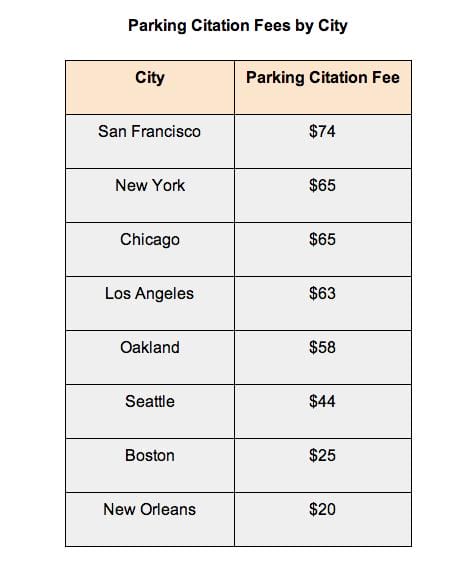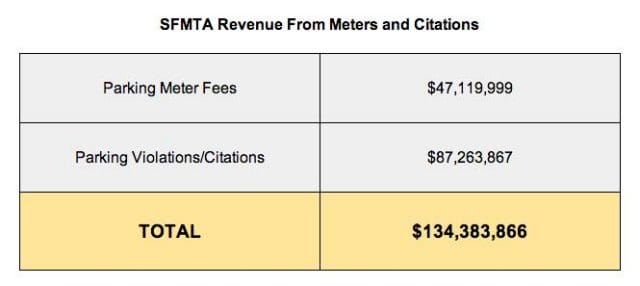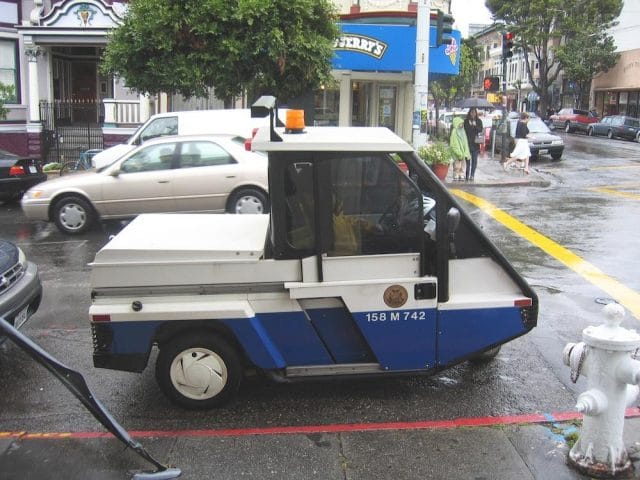If you’re a car owner in San Francisco, you’ve likely been brought to tears at least once by a dreaded white envelope under your wiper, or towering hourly parking meter rates. If so, you’ve probably wondered: exactly how much money does the city of San Francisco rake in from these revenue streams every year? For many, the cost of parking in this city seems unreasonably high, but how does it compare to other cities?
Here’s the answer: San Francisco has the the most expensive parking tickets in the entire United States.
Parking Citation Fees and Meter Fares
On its website, the San Francisco Municipal Transportation Agency (SFMTA) jokes, “Even parking tickets get a day off now and then.” During just three select days every year — Thanksgiving, Christmas, and New Years’ Day — the SFMTA doles out free parking, releasing city dwellers from the burden of enforced meters.
But this “gift” is deceiving; the SFMTA spends the other 362 days a year dutifully handing out parking tickets. Over the years, they’ve gotten quite expensive. In fact, at $74 a pop, the city’s standard parking tickets are the most expensive in the country — by nearly $10.
To put this fee into perspective, Boston, which has roughly the same land area and a slightly smaller population, only charges $25, one-third of SF’s fine, for a meter violation (see table below for fine rates in other major cities).

Data collected from city transportation agencies
In addition to the standard parking meter ticket, there are 111 different parking citations doled out in the city, ranging from $46 for “blocking a residential door” to $880 for “blocking access to a blue zone.” A small sample of these can be found below:
Selection of SF Parking Violations and Fines (FY 2013-4)
Source: SFMTA
According to Lance Greenfield, a 25-year veteran parking officer, there is only way to avoid these astronomical rates: “Pay for your meter. It’s a lot less expensive [than a citation], especially if you’re just doing something really quickly.”
However, San Francisco’s parking meters — all 29,058 of them — aren’t much cheaper.
SFpark, a subsidiary project of the SFMTA that experiments with demand-responsive meter pricing, states:
“Meter pricing can range from between 25 cents an hour to a maximum of $6 an hour, depending on demand. Parking meters on blocks within walking distance of the ballpark are priced between $5 and $7 an hour for events”
SFPark also conducted a comprehensive meter study (below) that revealed San Francisco has the fourth highest downtown parking meter rates — at $4.25 per hour — in North America, trailing only Vancouver (BC), Chicago, and New York City.
In 2013, San Francisco even began charging for meters on Sunday, a day on which meters had traditionally been free since the first one was installed on Polk Street in 1947. This decision alone gained the city an estimated $2.6 million per year in additional revenue.
Hourly Meter Rates Downtown By City
Source: SFpark
Revenue
The SFMTA reported $47,119,999 in annual revenue from meter fees in 2012. Excluding the three unmonitored days per year, and 52 Sundays (enforcement was not yet in place in 2012), that’s about $152,000 collectively, or $5.23 per meter, per day.
The SFMTA reported $87,263,867 in annual revenue from paid citations in 2012. This works out to an average of $281,500 per day.
SFMTA Revenue From Meters and Citations

San Francisco makes over $130 million per year — or $433,500 per day — in parking meter and citation revenue. Considering this, free parking on Thanksgiving, Christmas, and New Years’ Day only collectively costs the city $1.3 million in potential revenue, or .1% of SFMTA’s $831 million total operating revenue for 2013.
So, what exactly are all your parking tickets paying for?
For starters, the salaries of the people who give them to you. The SFMTA employs 263 “parking control officers” (better known as meter maids, or much worse). The San Francisco Controller’s Office lists a PCO’s average salary at $51,207 and on an average day, 175 of them are on active duty. In addition, they employ 23 senior PCOs, who make $63,500.
Your money also pays for the funny-looking, three-wheeled vehicles these officers cite you in. They’re called Go-4 Interceptors, and SFMTA has acquired 263 of them to the tune of $28,895 each. Yearly maintenance costs for the fleet run about $534,782.
But these costs are still just a drop in the bucket for the SFMTA; ultimately, most of the parking revenue gets sucked into the ever-growing MUNI budget deficit.
Conclusion
With citation fees and parking meter rates ballooning every year, it is no surprise that San Francisco has seen a 96% increase in bicycle commuters since 2006. The city has also made strides to reduce city residents’ dependence on cars by instituting new bike lanes and parking options, and improving MUNI access. In fact, the SFMTA and SFPark justify meter rate increases by enforcing their desire to beautify the city, reduce pollution, and avoid crowding.
Admittedly, it’s a little difficult to find the environmental virtue in these fees when you’re at the receiving end of a $74 ticket and mid-duel with a headstrong parking control officer. But next time you’re unloading six pounds of quarters into a meter, take a minute to appreciate the fact that you’re helping to alleviate SFMTA’s $17 million budget gap.
Or maybe you can question whether or not expensive parking is the solution to the city’s deficit.
This post was written by Zachary Crockett. Follow him on Twitter here, or Google Plus here.




